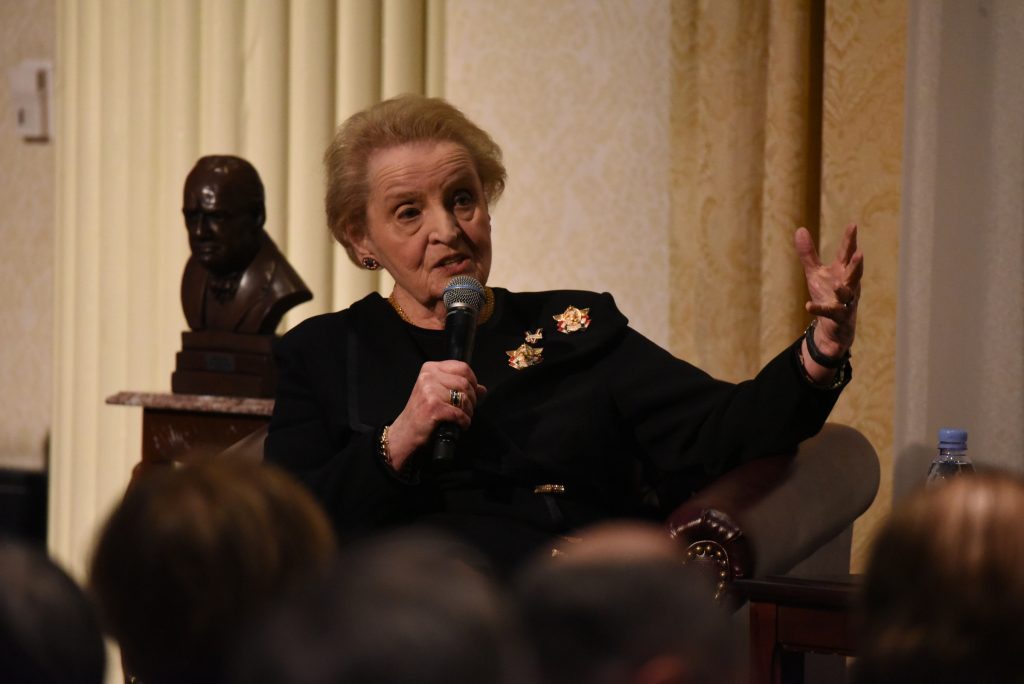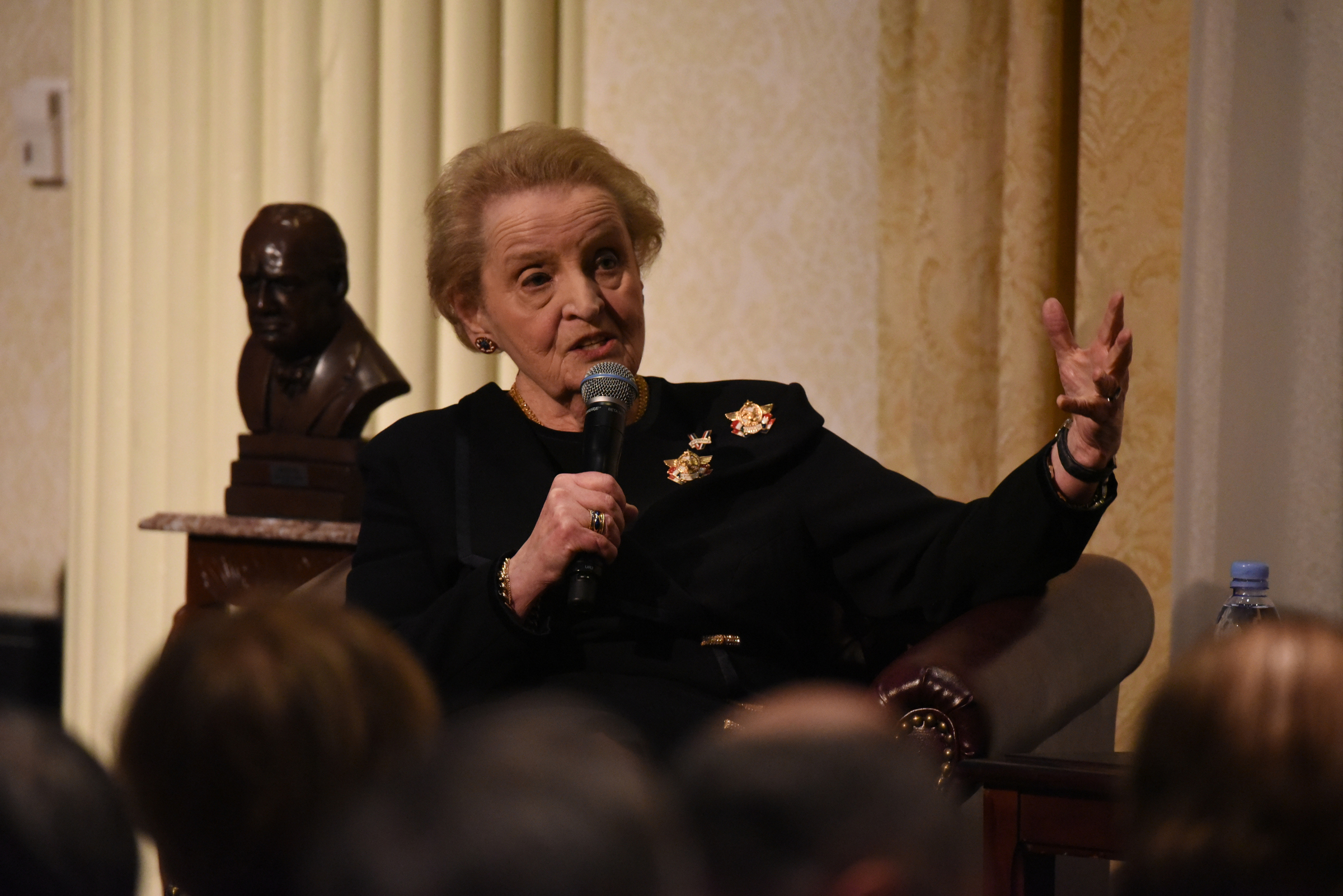
Finest Hour 168
“Leadership Matters”

September 9, 2015
Finest Hour 168, Spring 2015
Page 49
On Tuesday, 21 April, at the Waldorf-Astoria Hotel in New York City, The Churchill Centre presented the 2015 Churchill Leadership Award to former United States Secretary of State Madeleine Albright. She was introduced by Churchill Centre Chairman Laurence Geller and former British Foreign Secretary David Miliband. American journalist Tom Brokaw acted as Master of Ceremonies. We produce her speech in full.
 I am deeply moved to be given an award named for a leader whom I have always revered, by an organization that has done so much to promote his legacy here in the United States and around the world. I am also delighted to be in the presence this evening of Randolph Churchill, Edwina Sandys, and so many other friends and supporters of the Centre—including David Miliband. David, thank you for your remarks, and for your tireless efforts on behalf of the world’s refugees. I am proud to call you my friend.
I am deeply moved to be given an award named for a leader whom I have always revered, by an organization that has done so much to promote his legacy here in the United States and around the world. I am also delighted to be in the presence this evening of Randolph Churchill, Edwina Sandys, and so many other friends and supporters of the Centre—including David Miliband. David, thank you for your remarks, and for your tireless efforts on behalf of the world’s refugees. I am proud to call you my friend.
The size of tonight’s crowd reminds me of the time that Winston Churchill was asked, “Doesn’t it thrill you to know that every time you make a speech, the hall is packed to overflowing?” “It’s quite flattering,” Churchill replied, “but whenever I feel this way, I always remember that if instead of making a speech I was being hanged, the crowd would be twice as big.”
I approach this evening with a similar feeling of humility, mindful that the main reason you all are here tonight is the chance to feel the spirit of one of history’s true icons. The person I am referring to, of course, is Tom Brokaw.

2024 International Churchill Conference
I am also keenly aware that we gather tonight in the midst of a close election contest in the UK, and what is now known as presidential announcement season here in the United States. Which brings to mind another great observation of Churchill’s, this one about American politics: “I could never run for President of the United States,” he once said, “all that handshaking of people I didn’t give a damn about would kill me.”
His candor and gentility aside, Churchill remains a leader of unparalleled accomplishment in war and peace—a figure whose words and deeds, we can be certain, will still be recalled centuries from now.
For my part, I have always felt as if I grew up with Churchill, because my earliest memories are of London and the British countryside during World War II. I remember bomb shelters, blackout curtains, and being taken by my parents to the seashore despite the massive steel barriers erected to foil enemy attempts to invade. My family and I were in England because Churchill’s government was playing host to the Czechoslovak government in exile, whose cause my father served. So we saw first-hand how he rallied his countrymen to unite against the Nazi darkness, endure the Blitz, and find space for the continent’s refugee children.
As a very young girl, I also vividly recall Churchill’s stirring wartime oratory. I remember especially the impact it had on my parents, who could draw strength from Churchill’s pledge to the people of Czechoslovakia, in the dark days of 1940, that their “hour of deliverance will come.”
My father later wrote about the importance of Churchill in his book on the history of twentieth century Czechoslovakia—citing his messages of reassurance to Prague and his recognition of the government-in-exile as two important moments for the Czechoslovak resistance.
My parent’s admiration for Churchill was, of course, rooted in his fierce opposition to the Munich agreement. And indeed, they raised me to firmly believe that my native country had been betrayed by its Western allies. It has always been axiomatic in my mind that evil had to be opposed forcefully because it could not be appeased.
A question I think about more often now, however, is whether the lessons of Munich have been misinterpreted by leaders who lack Churchill’s vision. To be sure, it is vitally important for countries to live up to their treaty obligations, especially with small nations, and it was without question a tragic mistake to be naïve about Hitler. We must always be ready to confront anyone who tries to run roughshod over the rights of others.
But at the same time, we should be careful about assuming that the lessons of any one past event will apply perfectly in the future. Half a century ago, analogies to Hitler and Munich were used to justify the Vietnam War.
The truth is, we seldom make peace or negotiate with our friends, and we simply cannot exclude diplomatic compromise from our toolkit if we hope to make progress in responding to today’s threats.
So we should understand that not every situation is Munich—even as we always bear its broader lessons in mind. And having spent a considerable amount of time studying this period in history, I would suggest that there are three lessons in particular that are especially relevant today.
The first is simple: leadership matters.
As we enter election season, I disagree completely when people shrug their shoulders and say: all politicians are the same. If we could have replaced Neville Chamberlain with Winston Churchill or substituted almost anyone for Hitler before World War II, we could have saved tens of millions of people.
A second lesson is that we must balance restraint with resolve in international affairs.
Too often, our policy options are boiled down to a choice between appeasement and intervention. And throughout our history the United States has tended to move from one extreme to another—depending on whether we were tired of war or feeling vulnerable, as we did after 9/11.
In reality, our response to threats must be more sophisticated. We should not be too eager to embrace the use of military force, but neither should we be so averse to it that we lose a vital tool to protect our interests. We do have to care about people in faraway places with unpronounceable names.
The third and final lesson I would draw is that democracies must work together, and that America in particular must be engaged as a world leader. In the 1930s, the countries that opposed Hitler failed to coordinate effectively, and the United States was effectively absent from the international arena. But thanks to the leadership of Winston Churchill and his partnership with President Roosevelt, our nations joined forces and acted as a true alliance—yielding a victory that would have been impossible for any nation to achieve on their own.
Following World War II, there were questions about whether the United States would retreat from the world stage, but Winston Churchill and others argued forcefully that the time had come for America to assume the mantle of international leadership. In one memorable speech, he said that the great power amassed by the United States “imposed on the American people a duty which cannot be rejected. With opportunities comes responsibility.” Churchill said those words on March 15, 1946—and he said them in this very room.
Almost seventy years later, for all that has changed, I remain as convinced as ever that Americans have a unique responsibility in world affairs—one that cannot be rejected. We remain the indispensable nation—the only nation with the power to shape history, and the values to do so in the direction most of the world would prefer to go: towards justice, freedom, and progress for all. But there is nothing in the word “indispensable” that means going it alone.
We must stay engaged with our allies and friends— especially those across the Atlantic—in doing the hard work of fighting tyranny in all its forms. After all, that is the very cause that drove our hero, Winston Churchill, to live the remarkable life that he did.
So let me end by saying how grateful I am that there are people and organizations today committed to preserving his legacy and upholding the values he held dear. I am truly thrilled and honored to be associated with these efforts, and I once again thank the Winston Churchill Centre for this incredible award.
Subscribe
WANT MORE?
Get the Churchill Bulletin delivered to your inbox once a month.


